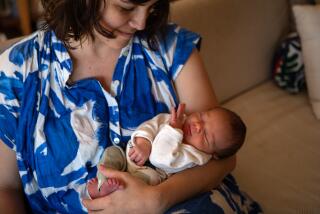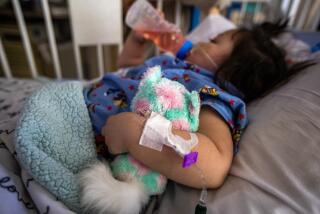Treatment Lessens Danger of Common Infant Ailment : Health: New medicine aids babies at risk of serious harm from a virus that usually causes mild symptoms.
A new treatment can prevent the sometimes devastating effects of one of the most widespread respiratory diseases of childhood, researchers said Wednesday.
Although virtually all children develop the illness by the age of 2, most have only cold-like symptoms. But significantly premature infants and those who have certain other childhood illnesses are especially susceptible to the effects of the ailment, which is caused by respiratory syncytial virus (RSV). An estimated 4,500 children die each year from RSV, and 91,000 are hospitalized.
But researchers, headed by Dr. Jessie R. Groothuis at Children’s Hospital in Denver, report today in the New England Journal of Medicine that monthly infusions of RSV immune globulin, a concentrate of antibodies from the blood of people who have already had the disease, were extremely effective. The injections reduced hospitalizations by 63%, admissions to the intensive care unit by 82% and total days spent in the intensive care unit by 97%.
“There are probably half a million kids in this country who would benefit from this,” Groothuis said in an interview.
“These new findings and their promise of keeping high-risk infants healthy and out of the hospital are an important advance in our ongoing effort to improve the health of all children,” said Dr. Anthony Fauci, director of the National Institute of Allergy and Infectious Diseases, which co-sponsored the study.
RSV is the culprit in many of the garden-variety respiratory infections that strike most children. But for a significant number of youngsters, the disease is not so benign.
Children at high risk for serious or fatal RSV infections include otherwise healthy infants less than three months old, premature babies during their first six months, and infants with chronic lung diseases, congenital heart diseases and immunodeficiency diseases.
The average cost of treating a high-risk child hospitalized for an RSV infection is about $70,000. Such treatment currently involves use of an antiviral drug called ribavirin, but that drug has limited value and often serious side effects.
Researchers have worked for years to develop an RSV vaccine but have had little success.
Disheartened scientists decided to make an end run on the vaccine by using immune globulin, which consists primarily of antibodies from the blood serum of people who have been exposed to the virus. Such preparations are now used to provide temporary protection to people who have already been exposed to certain viruses, including hepatitis A and B, rabies and chicken pox.
Researchers at MedImmune Inc. of Gaithersburg, Md., another of the sponsors of the new study, identified a pool of people who have at least five times the normal level of RSV antibodies and used their blood to prepare the serum.
Pediatricians in Denver and five other cities enrolled 249 high-risk children in the trial--102 with chronic lung disease, 87 with congenital heart disorders and 60 who had to spend time in intensive care when they were born prematurely. One-third received a high dose of the serum monthly during the RSV season (November to April), one-third received a lower dose and one-third received no serum, acting as controls.
For the low-dose group, there was a significant improvement only in the number of days spent in the intensive care unit. None of the low-dose children were in intensive care, compared to six children in the control group who spent a total of 34 days there.
But major improvements were apparent in the group receiving a high dose of the serum. There were only six hospital admissions in this group, compared to 18 in the control group; the high-dose group spent a total of 43 days in the hospital, compared to 128 days for the untreated babies. One infant in the high-dose group spent one day in intensive care.
The treatment also had few side effects. These included fluid overloads (from the infusion of the serum) and fever.






